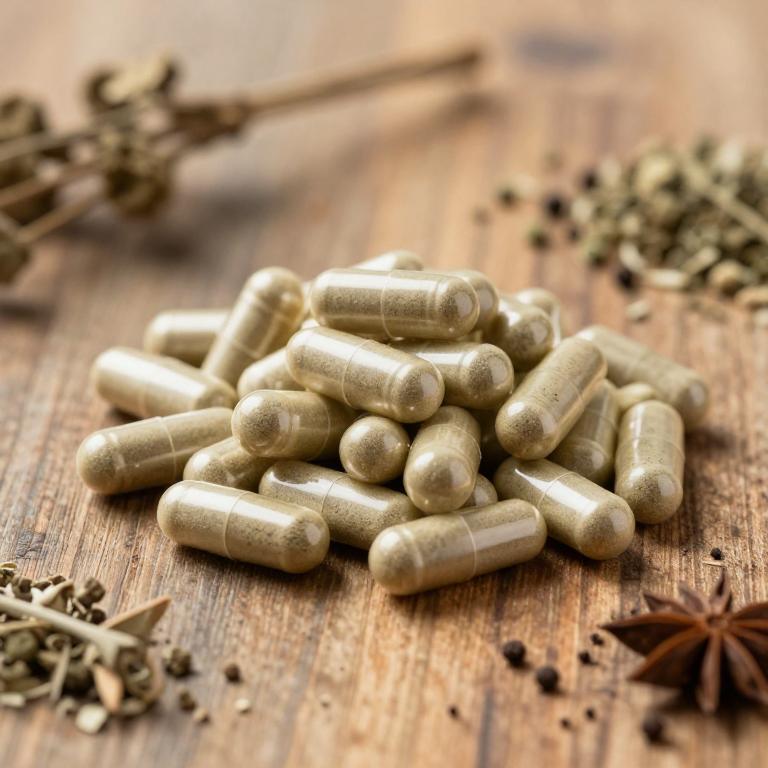10 Best Herbal Capsules For Upset Stomach

Herbal capsules are a popular natural remedy for alleviating symptoms of an upset stomach, often containing ingredients like ginger, peppermint, and chamomile, which are known for their soothing and anti-inflammatory properties.
These capsules are typically easy to swallow and offer a convenient alternative to over-the-counter medications, making them appealing to those seeking holistic health solutions. Many herbal capsules are made from plant-based ingredients and are generally considered safe for most people when used as directed. However, it is important to consult with a healthcare professional before use, especially for individuals with existing medical conditions or those taking other medications.
Overall, herbal capsules can be an effective and gentle option for managing mild digestive discomfort.
Table of Contents
- 1. Chamomile (Matricaria chamomilla)
- 2. Ginger (Zingiber officinale)
- 3. Turmeric (Curcuma longa)
- 4. Licorice (Glycyrrhiza glabra)
- 5. Thistle (Silybum marianum)
- 6. Cumin (Cuminum cyminum)
- 7. Fennel (Foeniculum vulgare)
- 8. Dog rose (Rosa canina)
- 9. Peperomia plant (Peperomia pellucida)
- 10. Black pepper (Piper nigrum)
1. Chamomile (Matricaria chamomilla)

Matricaria chamomilla, commonly known as chamomile, is a popular herbal remedy used to soothe upset stomachs due to its calming and anti-inflammatory properties.
Chamomile herbal capsules contain the dried flowers of the plant, which are rich in compounds like bisabolol and flavonoids that help reduce gastrointestinal irritation. These capsules are often taken in capsule form for convenience and to ensure a consistent dosage. They are particularly effective in relieving symptoms such as indigestion, bloating, and mild stomach cramps.
Chamomile is generally considered safe for most adults when used in recommended doses, though it should be avoided by those with allergies to related plants like ragweed.
2. Ginger (Zingiber officinale)

Zingiber officinale, commonly known as ginger, is widely recognized for its natural ability to alleviate symptoms of an upset stomach.
Herbal capsules containing ginger extract are a popular remedy for nausea, indigestion, and gastrointestinal discomfort. These capsules provide a convenient and standardized dose of ginger, making it easy to incorporate into a daily wellness routine. The active compounds in ginger, such as gingerol and shogaol, are believed to reduce inflammation and soothe the digestive tract.
When taken as directed, ginger capsules can offer a safe and effective alternative to over-the-counter medications for mild digestive issues.
3. Turmeric (Curcuma longa)

Curcuma longa, commonly known as turmeric, is widely used in herbal medicine for its anti-inflammatory and digestive properties.
Curcuma longa herbal capsules are often taken to alleviate symptoms of an upset stomach, such as bloating, indigestion, and mild gastrointestinal discomfort. The active compound in turmeric, curcumin, helps reduce inflammation in the digestive tract and may soothe irritation. These capsules are typically made from standardized extracts to ensure consistent potency and effectiveness.
While generally safe, it is advisable to consult a healthcare professional before using curcuma longa capsules, especially for prolonged periods or in combination with other medications.
4. Licorice (Glycyrrhiza glabra)

Glycyrrhiza glabra, commonly known as licorice root, has been traditionally used in herbal medicine for its soothing effects on the digestive system.
Glycyrrhiza glabra herbal capsules are often taken to alleviate symptoms of upset stomach, such as bloating, indigestion, and nausea, due to their anti-inflammatory and demulcent properties. These capsules contain glycyrrhizin, a compound that helps protect the stomach lining and reduce irritation. However, long-term use of glycyrrhiza glabra may lead to side effects like increased blood pressure and potassium loss, so it should be used under medical supervision.
Overall, these capsules can be a natural remedy for mild digestive discomfort when used appropriately.
5. Thistle (Silybum marianum)

Silybum marianum, also known as milk thistle, is a herbal remedy commonly used in the form of capsules to support digestive health.
These capsules contain the active compound silymarin, which is believed to have protective effects on the liver and may help alleviate symptoms of an upset stomach. Silybum marianum is often recommended for individuals experiencing digestive discomfort, such as bloating, nausea, or indigestion. Its mild nature makes it a popular choice for those seeking natural alternatives to conventional medications.
However, it is important to consult with a healthcare professional before starting any new herbal supplement, especially if you have underlying health conditions or are taking other medications.
6. Cumin (Cuminum cyminum)

Cuminum cyminum, commonly known as cumin, is a widely used herb that has been traditionally valued for its digestive benefits.
Cumin herbal capsules are often formulated to support digestive health and may help alleviate symptoms of an upset stomach, such as bloating, gas, and indigestion. The active compounds in cumin, including essential oils and flavonoids, are believed to stimulate the production of digestive enzymes and improve gut motility. These capsules are typically made from standardized cumin extract and are available in various forms for easy consumption.
When used as part of a balanced diet and lifestyle, cumin herbal capsules may offer a natural and supportive option for those experiencing mild digestive discomfort.
7. Fennel (Foeniculum vulgare)

Foeniculum vulgare, commonly known as fennel, is often used in herbal capsules to alleviate symptoms of an upset stomach.
The essential oil of fennel contains compounds like anethole, which have mild antispasmodic and carminative properties that can help ease digestive discomfort. These capsules are typically taken in small doses, either before or after meals, to support digestion and reduce bloating or gas. Fennel is also believed to soothe the lining of the stomach and may help with mild indigestion or nausea.
However, it is important to consult with a healthcare provider before using fennel capsules, especially for individuals with allergies or those taking other medications.
8. Dog rose (Rosa canina)

Rosa canina, also known as dog rose, is a traditional herbal remedy commonly used in the form of capsules to support digestive health.
These capsules contain the dried berries of the Rosa canina plant, which are rich in antioxidants, vitamins, and bioflavonoids that may help soothe an upset stomach. The anti-inflammatory and antispasmodic properties of Rosa canina are believed to reduce gastrointestinal discomfort and promote healthy digestion. Many people find relief from symptoms such as bloating, indigestion, and mild stomach cramps when using Rosa canina herbal capsules regularly.
As a natural supplement, it is often recommended as a gentle alternative to conventional medications for occasional digestive issues.
9. Peperomia plant (Peperomia pellucida)

Peperomia pellucida, also known as the "Mexican nettle," is a traditional herbal remedy that has been used for centuries to soothe upset stomachs and digestive discomfort.
The plant contains bioactive compounds such as flavonoids and tannins, which are believed to have anti-inflammatory and astringent properties that can help reduce gastrointestinal irritation. Peperomia pellucida herbal capsules offer a convenient and concentrated form of this plant, making it easy to incorporate into a daily wellness routine. These capsules are often recommended for individuals experiencing mild digestive issues, such as bloating, indigestion, or nausea.
However, it is important to consult with a healthcare professional before using this herb, especially if you have pre-existing medical conditions or are taking other medications.
10. Black pepper (Piper nigrum)

Piper nigrum, commonly known as black pepper, is often used in herbal remedies for its potential digestive benefits.
Herbal capsules containing piper nigrum are believed to support digestion by stimulating the production of digestive enzymes and improving gut motility. These capsules may help alleviate symptoms of an upset stomach, such as bloating and gas, due to their mild carminative properties. However, it is important to consult a healthcare professional before using piper nigrum supplements, especially for individuals with existing medical conditions or those taking other medications.
While some studies suggest possible benefits, more research is needed to fully understand its efficacy and safety for digestive health.